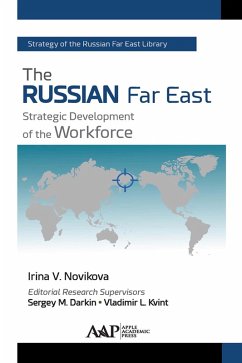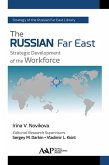This monograph presents an integrated concept of workforce development strategy for the Far Eastern Federal District of Russia. This concept is based on the strategizing methodology developed by Vladimir L. Kvint. The concept takes into account contemporary global, national, and regional development trends in workforce, employment, and labor market issues, including the active influence of information and communication technologies and the appearance of numerous novel forms of employment.
The Russian Far East is a region of geostrategic importance for the whole world, rich in minerals that can be extracted provided that the region has the necessary-and correctly applied-workforce. This volume shows the uniqueness of the region's workforce and factors that impact workforce development. The author identifies strategic factors influencing workforce development, namely, migration, education system, income sources, and business climate. The monograph identifies, with allowance made for global trends, the main components of workforce development strategy for the Far East: mission, vision, strategic advantages, and priorities. The measures proposed are evaluated in terms of public and economic efficiency. The conclusions and proposals in this work are built on the analysis of this wide range of analytical data. Workforce development programs, from the Tsarist era until the present, are analyzed in this work, and creative approaches to the workforce provision problems of the Russian Far East and appraisal criteria for the strategy's public and economic efficiency are proposed. Applying the information provided in this book will help to improve efficiency of investments in the economy of the Russian Far East using its labor potential.
This book belongs to the Strategy of the Russian Far East Library developed under the editorial supervision of Sergey Darkin and Vladimir Kvint.
The Russian Far East is a region of geostrategic importance for the whole world, rich in minerals that can be extracted provided that the region has the necessary-and correctly applied-workforce. This volume shows the uniqueness of the region's workforce and factors that impact workforce development. The author identifies strategic factors influencing workforce development, namely, migration, education system, income sources, and business climate. The monograph identifies, with allowance made for global trends, the main components of workforce development strategy for the Far East: mission, vision, strategic advantages, and priorities. The measures proposed are evaluated in terms of public and economic efficiency. The conclusions and proposals in this work are built on the analysis of this wide range of analytical data. Workforce development programs, from the Tsarist era until the present, are analyzed in this work, and creative approaches to the workforce provision problems of the Russian Far East and appraisal criteria for the strategy's public and economic efficiency are proposed. Applying the information provided in this book will help to improve efficiency of investments in the economy of the Russian Far East using its labor potential.
This book belongs to the Strategy of the Russian Far East Library developed under the editorial supervision of Sergey Darkin and Vladimir Kvint.
Dieser Download kann aus rechtlichen Gründen nur mit Rechnungsadresse in A, B, BG, CY, CZ, D, DK, EW, E, FIN, F, GR, HR, H, IRL, I, LT, L, LR, M, NL, PL, P, R, S, SLO, SK ausgeliefert werden.



